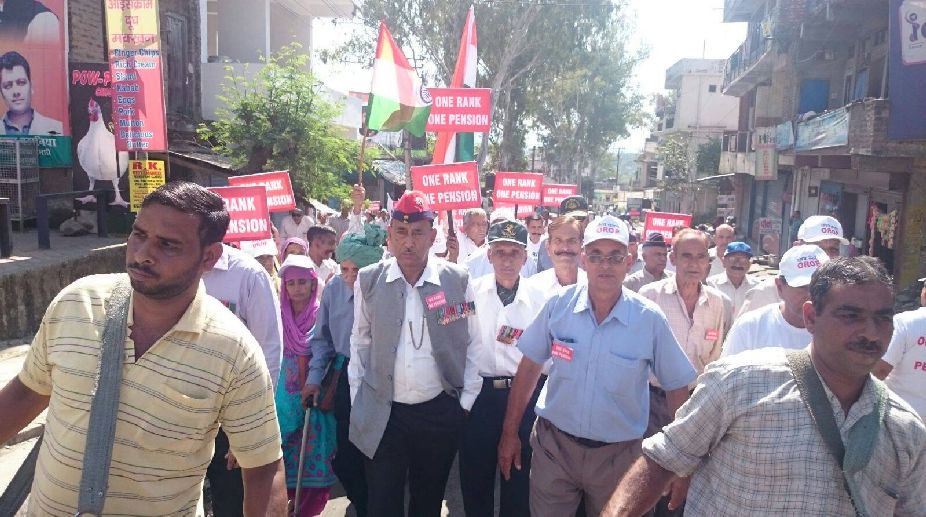The veterans’ agitation over OROP at Jantar Mantar was in its initial stages a success as it compelled the government to act. It gained national sympathy when police targeted decorated veterans on the eve of Independence Day 2015. It forced a senior police officer to come to the site and apologise for police highhandedness.
After the OROP announcement, many veterans felt that the agitation did not merit continuation as the government had fulfilled a part of its promise, leaving only those some to continue agitating at Jantar Mantar. Between the initial release and now, a lot of water has flowed under the bridge impacting both the veteran and the serving.
There have been a series of actions by the bureaucracy, supported by the government, to degrade the military’s status. As per service protocol those in uniform are denied the right to complain or project perceived wrongdoings in the public domain.
Morale is impacted, but this is kept away from the public eye. Hence, it is the voice of the veterans alone that is heard. No bureaucracy can function without tacit support of the government. This is more so in India which as a rising superpower keeps the armed forces subservient to the Ministry of Defence (MoD) rather than amalgamating the two.
The MoD visualizes service HQs as competitors and seeks to downgrade them, desiring greater control over functioning. Ironic but true, the Indian armed forces are probably the only ones that expend more energy battling internal bureaucratic adversaries than external threats. The battle is not for ensuring national security, but for one-upmanship.
The forcible eviction of protesting veterans from Jantar Mantar was possibly done under government directions. This is evident as there was a near complete media blackout. It left the veteran community angry but also at a loss, with limited alternate options to continue the protest. Ram Lila Maidan, the proposed venue for future protests, involves high costs and would be away from the limelight.
Secondly, the national veterans’ leadership which led the OROP battle is facing internal strife and dissension and is also being accused of turning political, in contrast to the apolitical nature of the armed forces. Thus, the government succeeded in breaking the back of a protest which had embarrassed it. It is known that governments only act under pressure, mainly of vote banks. Veterans and the serving together can impact vote banks in many states.
The present BJP government gained maximum support from the military community post its veterans’ Rewari rally in 2014. The opposite happened in Punjab. But many of the promises have not been kept, and even OROP as implemented is half-baked. In the present environment, a strong veterans’ community is needed to support the serving. Some actions by the government against the serving include unilaterally seeking to lower the military’s status by re-evaluating equivalence, battling its own in courts to deny them Non-Functional Upgradation (NFU) and in many cases even family and war casualty pensions to widows.
It has refused to grant Junior Commissioned Officers (JCOs) an increased Military Service Pay (MSP), cancelled entitled rations for officers and is seeking to impose civilians in service HQs to further impact the functioning of the armed forces. Its anti-veteran actions include a poorly implemented OROP, way below what it had itself promised.
It has delayed release of the Reddy committee report for a year. Most importantly, the government has failed to ensure that percentages of reserved vacancies earmarked for veterans, released under central government orders, for Central Armed Police Forces, PSUs, central government offices and banks are made available to them. It has never instructed states to ensure this, so that even BJPrun states are ignoring veteran quotas.
Simultaneously, they have taken political advantage of armed forces operations, surgical strikes and anti-militancy, as also tasked the forces to undertake actions to assuage local anger against state governments under the BJP. These include compelling them to build foot over bridges in Mumbai, provide medical support during doctors’ strike in Rajasthan and clear garbage where others refuse to move. These shortcomings, impacting morale of the serving and veterans, need to be projected to veterans and armed forces supporters. The next major veteran versus government battle will be the 2019 general election.
Hence, the veterans need to reorganise and restructure their organisation and compel the government to act. The present central committee based in Delhi, now splintered and ineffective, needs to be reconstituted at local levels. For effective results, state level apolitical veteran committees, with representatives from rural areas, from every service and rank structure and employing social media as a tool of communication, can spread the word far and wide.
The main organisation at Delhi may be able to help in setting up committees, but should not intervene in their functioning. The Bonus agitation of the early 1920s had shaken the US government. The same can happen in India only if veterans unite. Creating an effective veterans’ organisation is the need of the hour.
While the Delhi group can deal with the Centre as also gain media coverage, the same at state levels can impact vote banks. With 2019 as the target, veterans’ leaders need to start thinking out of the box. It is only veterans who can and must support the serving in their battle for survival against the bureaucracy.
(The writer is a retired Major-General of the Indian Army)











